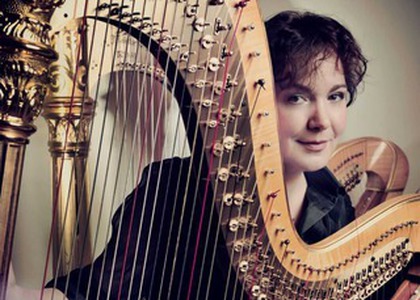> Interviews

Interview with harpist Maria Bîldea
The musician is on Friday, November 1st, 2024, the soloist of the concert performed by the National Radio Orchestra, conducted by conductor Cristian Mandeal. The concert marks the 96th anniversary of Radio România.
Mrs. Maria Bîldea, how would you describe your relationship with the National Radio Orchestra and conductor Cristian Mandeal?
I came to Romania six years ago, when I returned for good from Greece. For six years I have been a member of the National Radio Orchestra, I have played with them both as a soloist and as a member of the orchestra. I have already played a Ginastera concerto with the National Radio Orchestra, a Mozart concerto with the Chamber Orchestra, and with Maestro Mandeal I played Introduction and Allegro by Ravel and Sacred Dance and Profane Dance by Debussy two years ago. It's a pleasure to play with my orchestra, I feel very good with them.
I have played with Master Mandeal many times in Greece, in the orchestras where I have been for 30 years, and I want to say that I admired him since my youth. In Greece it is received with great warmth, so it will be a joy for me to sing again on the same stage.
You will perform the Concerto for Harp and Orchestra by Paul Constantinescu. How would you describe how the composer approaches the harp?
I haven't played this concert for 37 years, before leaving the country, when I played it with the Ploiesti Philharmonic Orchestra, led by maestro Ion Baciu. For three decades something did not happen to be scheduled with him, so last year I was very happy when I was proposed to play this concert.
Lately I have been leaning more towards unsung Romanian music. I have always played Romanian music and in the programs of all my recitals I have also included Romanian songs. Over the years I have sung works by Dan Dediu as much as I could. The concerto by Paul Constantinescu was written for Mrs. Liana Pascquali, my teacher's mentor and mine, a school builder in Romania, who also listened to me 40 years ago when I was studying him for the Bachelor's exam at the Conservatory. The first audition was with Mrs. Liana Pasquali, after which the concert was played many times by Maestro Elena Gantolea, and even my first audition with this concert in my school years was at the Radio Hall with Mrs. Gantolea.
Paul Constantinescu uses all the folklore language, which he imagines or even takes over existing themes in Romanian folklore. The concerto begins with the harp motif as a bucium signal, made on the harmonics of the E-flat sound, after which comes a very playful, folklore theme, everything being written on modal harmonies. It is a strongly chromatized language, which subjects the harpist to extreme leg labor. We also deal with dance themes... In the second part, we have narrative themes; then a lullaby appears. And the third part is an absolutely frantic dance. You can imagine Paul Constantinescu using the harp like the cymbal, which is very refreshing. It is not an easy concert, which is why not much was played in Romania. It's music you really enjoy!
Your work in Greece profoundly marked the destiny of the harp. How would you describe the influence of over 30 years you spent in Greece on harp schools.
It's been 37 since I put in the first pebble, and now these harp classes have already branched out; it's not just in Thessaloniki and Athens anymore. I already have the third generation of students, and those who now teach the instrument in Thessaloniki and Athens are my first students, with whom I started the harp lessons in 1989. We already have some harpists who have also perfected at Juillard, at Peabody in America and even at UdK University in Berlin. Behold, we now have two Greek students at UdK, and even one from Romania. It is a joy to see that something is also happening with this instrument in Greece. In fact, what is unbelievable is that for four decades before I came to Greece, this instrument was no longer taught; it even had a break, so I could say it was a revival of the school.
Meanwhile, in Romania I teach at the University of Music in Bucharest and I organize many masterclasses in the country as well. I think I still have something to say and I do it with great pleasure.
Translated by Darius Baciu,
University of Bucharest, Faculty of Foreign Languages and Literatures, MTTLC, year I
Corrected by Silvia Petrescu














